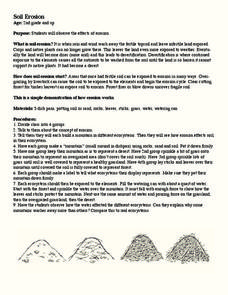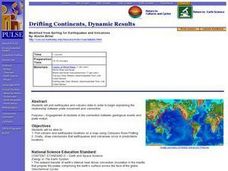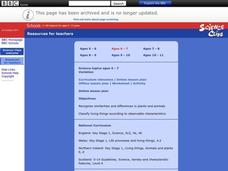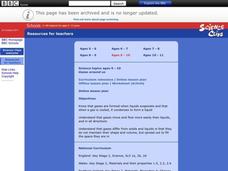Curated OER
How We See Things
Students explain that when a beam of light is reflected from its surface, it changes direction. In this virtual science experiment lesson plan, students complete an activity that requires them to investigate how flat mirrors reflect...
Curated OER
Growing Plants
Pupils explore plants and recognize that they are living things that require light and water to grow. In this online plant biology lesson, students identify, name and match the parts of plants. Extension activities and suggested homework...
Curated OER
Pushes and Pulls
Young scholars examine different types of movement and causes that may affect those movements. In this online interactive forces and motion lesson, students use toy cars to observe push and pull and then make predictions and collect data...
Curated OER
Gases Around Us
Students investigate gases and liquids. In this states of matter online lesson, students examine how evaporation plays a part in the transition of liquids into gases as they watch a kettle of water boil and then work in small groups on...
Curated OER
Health and Growth
Students identify healthy foods. In this nutrition instructional activity, students review the five food groups and categorize healthy and unhealthy foods on a chart. Students develop their own menus.
Curated OER
Characteristics of Materials
Students describe and compare common properties of various classroom materials. In this science/matter lesson, students observe common classroom items and the materials they are made of to complete a list of common properties.
Curated OER
Micro-organisms
Students discuss micro-organisms. In this micro-organisms lesson, students identify which micro-organisms are harmful and which ones are beneficial. Students complete a worksheet which is included in the lesson.
Alabama Learning Exchange
What Color Are The Leaves?
Young scholars identify the colors in leaves. In this chromatography instructional activity, students read the book Why Do Leaves Change Color? and construct chromatography strips to identify the colors of leaves.
Curated OER
Frozen Film
Students discover how light reflects off surfaces. In this hands-on demonstration, students examine how variations in color are produced by light interference.
Curated OER
Soil Erosion
Second graders complete activities to observe the effects of erosion. In this erosion lesson, 2nd graders define erosion and learn the process. Students complete an erosion experiment.
Curated OER
Sustainable Southern Belize: Coral Health Lesson Plan
Fifth graders investigate coral reefs and the dangers they face by labeling and drawing. In this oceanography lesson, 5th graders view a PowerPoint presentation of photographs of coral reefs in Belize. Students investigate and...
Curated OER
Models of Succession
Students create a model city in order to understand the effects human habitats have on the environment. In this environment instructional activity, students examine the effects human habitats have on the environment. Students create a...
Curated OER
Losing An Island
Students examine carbon dioxide and determine the impact of greenhouse gases on the earths spheres. In this pollution lesson students complete a lab activity to see the impact of gases on the environment,
Curated OER
Hey, Look Me Over!
Students make observations about mealworms using hand lenses, rulers, and cotton swabs. Students complete their own mealworm observation chart, then they share their observations with the class. This is one station out of five in an...
Curated OER
Up, Up, and Away
Second graders observe the changes that water has when there is a change in a state of matter. In this lesson they observe the results of applying heat to water with the end result of conversion to a gas.
Curated OER
Drifting Continents, Dynamic Results
Students plot earthquake and volcano data using a Compass Rose Plotting. They explain the relationship between plate movement and connection. They draw conclusions that earthquakes and volcanoes occur in predictable locations.
Curated OER
Ourselves
Students use a website to name and compare external body parts of humans and other animals.
Curated OER
Sound and Hearing - Internet Research
Students use a website to help them recognize that sound is generated in a variety of ways and from different sources. They determine that sounds vary in tone and loudness, and learn there are different ways to describe sound.
Curated OER
Moving and Growing
Students know that humans and some other animals have bony skeletons inside their body. They know that other animals have skeletons on the outside of their bodies. They explain the role of both kinds of skeletons.
Curated OER
Circuits and Conductors
Young scholars participate in an online lesson to explain the conductivity of different materials and the effect of changing the power source.
Curated OER
Variation
Students participate in an online lesson to reinforce the similarities and differences in plants and animals. They classify living things according to observable characteristics.
Curated OER
Gases Around Us
Learners participate in an online lesson showing that gases are formed when liquids evaporate and that when a gas is cooled, it condenses to form a liquid, and gases move and flow more easily than liquids, and how gases differ from solids.
Curated OER
Changing State
Students participate in an online lesson plan to investigate the effects of cooling and heating on water.
Other popular searches
- Powerpoint Rock Cycle
- The Rock Cycle
- Rock Cycle Diagram
- Rock Cycle 6th Grade
- Rock Cycle Activities
- Earth Science Rock Cycle
- Rock Cycle Internet Search
- Free Powerpoint Rock Cycle
- Dance Rock Cycle
- Rock Cycle Lesson
- Rock Cycle Play Dough
- Rock Cycle Crayon Experiment

























